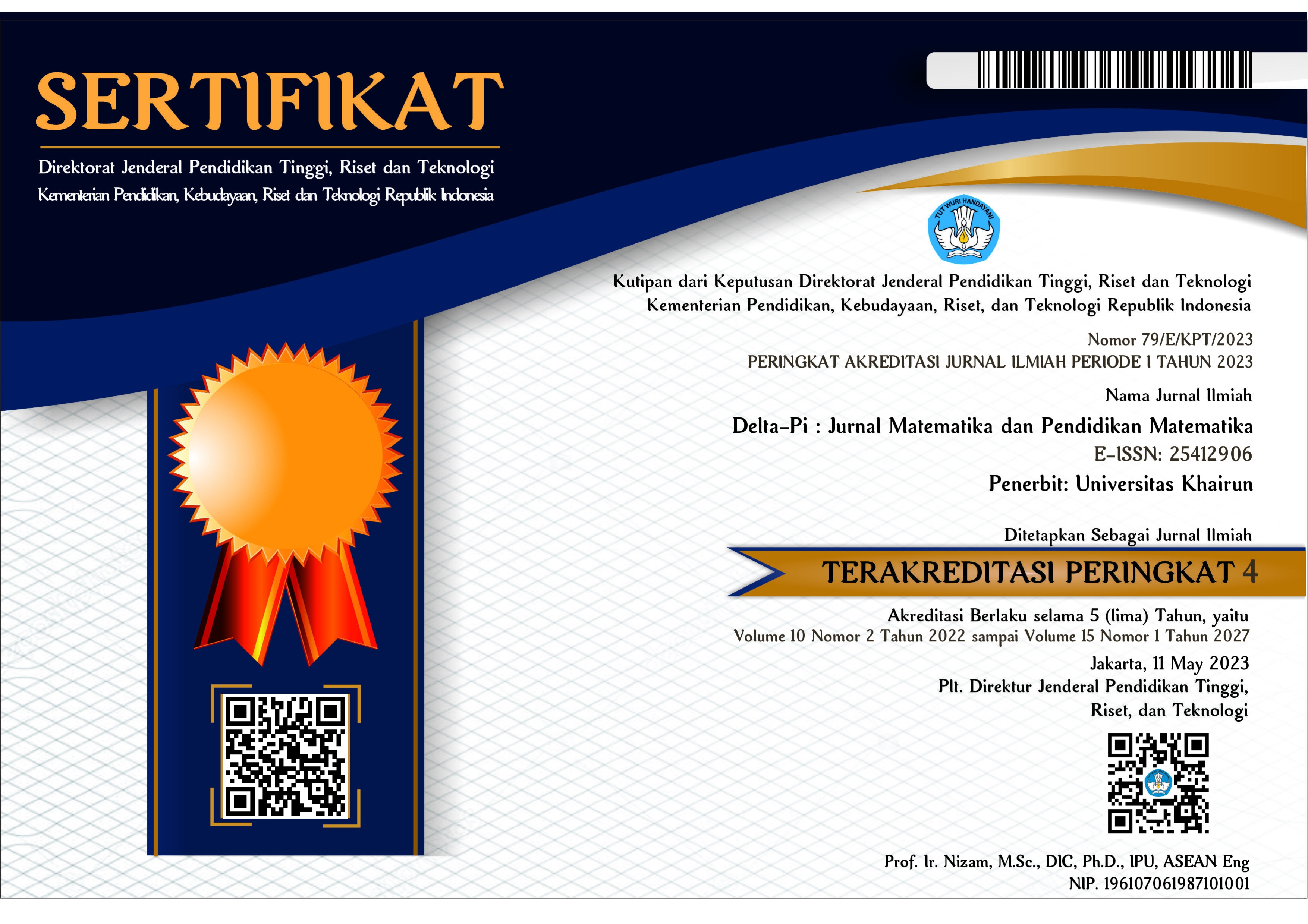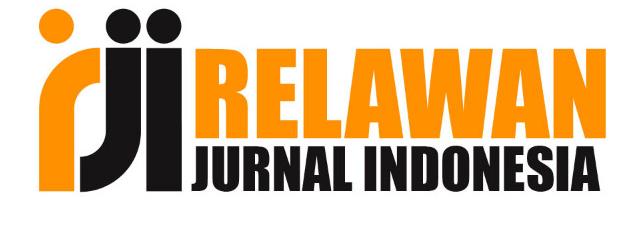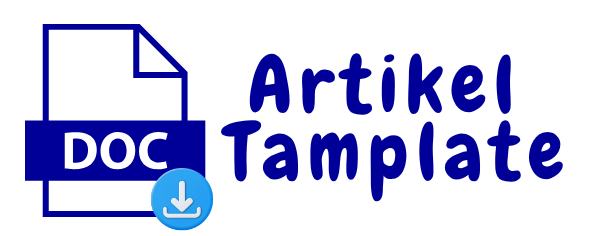Karakteristik bernalar mahasiswa dalam memecahkan masalah geometri ditinjau dari perbedaan gender
Sari
Penelitian ini bertujuan untuk mendeskripsikan karakteristik bernalar mahasiswa dalam memecahkan masalah geometri ditinjau dari perbedaan gender.
Untuk mencapai tujuan tersebut, peneliti melakukan prosedur penelitian dalam dua tahap yakni (1) mengkaji teori-teori tentang penalaran, masalah dan pemecahan masalah, materi geometri dan gender; menentukan lokasi penelitian dan merancang instrument penelitian; (2) menentukan responden penelitian, melaksanakan wawancara berbasis tugas dan menganalisis data penelitian. Data yang terkumpul dianalisis melalui tahapan reduksi data, paparan data dan penarikan kesimpulan.
Hasil yang diperoleh dari penelitian ini yakni: (1) karakteristik bernalar mahasiswa laki-laki dalam memecahkan masalah geometri melibatkan berpikir dasar, berpikir kritis dan berpikir kreatif. Khusus untuk berpikir kreatif, penalaran mahasiswa laki-laki muncul saat merencanakan dan melaksanakan pemecahan masalah. Mereka kreatif membangun ide-ide baru dan mengkontruksi menjadi beberapa strategi pemecahan masalah. (2) Karakteristik bernalar mahasiswa perempuan dalam memecahkan masalah geometri secara umum melibatkan berpikir dasar dan berpikir kritis. Mereka juga mampu membangun ide-ide baru dan mengkonstruksinya menjadi strategi pemecahan masalah. Perbedaan bernalar kedua kelompok mahasiswa ini dalam memecahkan masalah geometri bahwa kelompok mahasiswa laki-laki nampak lebih kreatif dalam membangun ide-ide baru dalam memecahkan masalah geometri dibandingkan kelompok mahasiswa perempuan. Sedangkan persamaan kedua kelompok mahasiswa ini dalam memecahkan masalah geometri keduanya melibatkan berpikir dasar dan berpikir kritis.
Teks Lengkap:
PDFReferensi
Daftar Pustaka
Ayuningtyas, W., & Pramudya, I. (2019). Students’ responses to the test instruments on geometry reasoning ability in senior high school. Journal of Physics: Conference Series, 1265(1), 12015. https://doi.org/10.1088/1742-6596/1265/1/012015
Bayuningsih, A. S., Usodo, B., & Subanti, S. (2018). Critical thinking level in geometry based on self-regulated learning. Journal of Physics: Conference Series, 983(1). https://doi.org/10.1088/1742-6596/983/1/012143
Feriyanto, F., Series, R. P.-J. of P. C., & 2020, undefined. (2020). Developing mathematics module based on literacy and higher order thinking skills (HOTS) questions to train critical thinking ability of high school students in. Iopscience.Iop.Org, 1594(1). https://doi.org/10.1088/1742-6596/1594/1/012014
Hasanah, S., Tafrilyanto, C., Physics, Y. A.-J. of, & 2019, undefined. (2019). Mathematical Reasoning: The characteristics of students’ mathematical abilities in problem solving. Iopscience.Iop.Org, 1188(1), 1–8. https://doi.org/10.1088/1742-6596/1188/1/012057
Hidajat, F. (2021). Students Creative Thinking Profile as a High Order Thinking in the Improvement of Mathematics Learning. ERIC, 10(3), 1247–1258. https://doi.org/10.12973/eu-jer.10.3.1247
Hidajat, F. A. (2021). Students Creative Thinking Profile as a High Order Thinking in the Improvement of Mathematics Learning. European Journal of Educational Research, 10(3), 1247–1258. https://doi.org/10.12973/eu-jer.10.3.1247
Ilma Indra Putri, R., Alwi, Z., Sapta Nusantara, D., Martua Ambarita, S., Maharani, Y., & Puspitasari, L. (2020). How Students Work With PISA-Like Mathematical Task Using Covid-19 Context. Journal on Mathematics Education, 11(3), 405–416. https://doi.org/10.22342/jme.11.3.12915.405-416
Kurshumlia, R., Research, E. V.-E. J. of E., & 2021, undefined. (2021). Using Reciprocal Teaching for Improving Students’ Skills in Mathematical Word Problem Solving--A Project of Participatory Action Research. ERIC, 10(3), 1371–1382. https://doi.org/10.12973/eu-jer.10.3.1371
Lowrie, T. (2018). Equity and spatial reasoning: reducing the mathematical achievement gap in gender and social disadvantage. Mathematics Education Research Journal, 30(1), 65–75. https://doi.org/10.1007/s13394-017-0213-7
M. Noviarsyh Dasaprawira, Z. & E. S. (2019). Developing Mathematics Question Of PISA Type Using Bangka Context. JME (Journal of Mathematics Education), 10(2), 303–314. https://eric.ed.gov/?id=EJ1218133
Miles, M., Huberman, A., & Saldana, J. (2014). Qualitative Data Analysis: A Methods Sourcebook. SAGE. https://id.id1lib.org/book/3593988/83e08f
Nugrahanto, S., -, D. Z., 2018, L. and E. (ICILLE, & 2019, undefined. (2019). Indonesia PISA result and impact on the reading learning program in Indonesia. Atlantis-Press.Com. https://www.atlantis-press.com/article/55917497.pdf
Nusantara, D. S., Zulkardi, & Putri, R. I. I. (2020). Designing PISA-like mathematics problem in covid-19 pandemic (PISAComat). Journal of Physics: Conference Series, 1657(1), 012057. https://doi.org/10.1088/1742-6596/1657/1/012057
Pratama, G. S., & Retnawati, H. (2018). Urgency of Higher Order Thinking Skills (HOTS) Content Analysis in Mathematics Textbook. J. Phys, 12147. https://doi.org/10.1088/1742-6596/1097/1/012147
Putriarum Tanudjaya, C., & Doorman, M. (2020). Examnining Higher Order Thinking In Indonesian Lower Secondery Mathematics Classrooms. Journal on Mathematics Education, 11(2), 277–300. https://doi.org/10.22342/jme.11.2.11000.277-300
Sadieda, L., Indayati, T., Physics, M. F.-J. of, & 2018, undefined. (2018). Developing an assessment instrument of higher order thinking skills in mathematics with in Islamic context. Iopscience.Iop.Org, 12151. https://doi.org/10.1088/1742-6596/1097/1/012151
Saryanto, T., of, I. S.-I. C., & 2021, undefined. (2021). Are Students’ Critical Thinking Skills in Problem Solving Influenced by Gender? Atlantis-Press.Com. https://www.atlantis-press.com/article/125964037.pdf
Septia, T., Charitas, R., Prahmana, I., Wahyu, R., Islam, U., Rahmat, R., Raya Mojosari, J., & Timur, J. (2018). Improving Students Spatial Reasoning with Course Lab. ERIC, 9(2), 327–336. https://eric.ed.gov/?id=EJ1194316
Sidiq, Y., Ishartono, N., … A. D.-J. P., & 2021, undefined. (2021). Improving elementary school students’ critical thinking skill in science through hots-based science questions: A quasi-experimental study. Researchgate.Net. https://doi.org/10.15294/jpii.v10i3.30891
Simamora, R., Mathematics, S. S.-I. E. J. of, & 2019, undefined. (n.d.). Improving Students’ Mathematical Problem Solving Ability and Self-Efficacy through Guided Discovery Learning in Local Culture Context. ERIC. Retrieved April 5, 2022, from https://eric.ed.gov/?id=EJ1227360
Supena, I., Darmuki, A., & Hariyadi, A. (2021). The Influence of 4C (Constructive, Critical, Creativity, Collaborative) Learning Model on Students’ Learning Outcomes. International Journal of Instruction, 14(3), 873–892. https://doi.org/10.29333/iji.2021.14351a
Sutiarso, S. (2019). The ability of students’ mathematical proof in an introduction to group theory in terms of gender differences. Repository.Lppm.Unila.Ac.Id, 2(20), 60–67. https://doi.org/http://dx.doi.org/10.23960/jpmipa/v20i2.pp60-67 Received:
Suwarma, I., Cultural, S. A.-J. of I. in E. and, & 2022, undefined. (2022). Explore Teachers’ Skills in Developing Lesson Plan and Assessment That Oriented on Higher Order Thinking Skills (HOTS). Jiecr.Org, 106–113. http://jiecr.org/index.php/jiecr/article/view/66
Syarifah, T., Research, P. N.-E. J. of E., & 2021, undefined. (2021). Profile of Students’ Problem-Solving Skills Viewed from Polya’s Four-Steps Approach and Elementary School Students. ERIC, 10(4), 1625–1638. https://doi.org/10.12973/eu-jer.10.4.1625
Tambunan, H., (EduLearn), T. N.-J. of E. and L., & 2019, undefined. (2019). Performance of mathematics teachers to build students’ high order thinking skills (HOTS). Uhn.Ac.Id, 13(1), 111–117. https://doi.org/10.11591/edulearn.v13i1.11218
Umardiyah, F., … Z. R.-: A. science in L., & 2021, undefined. (2021). Development of Teaching Materials on Geometry Materials to Develop Students’ Critical Thinking Skills According to the Criteria for Critical Thinking 4C’s. Ejournal.Unwaha.Ac.Id, 1(2), 71–76. https://ejournal.unwaha.ac.id/index.php/application/article/view/1666
Wahyuni, E., Series, A. H.-J. of P. C., & 2019, undefined. (2019). Profile of the student’s mathematical reasoning ability in solving geometry problem. Iopscience.Iop.Org, 12079. https://doi.org/10.1088/1742-6596/1211/1/012079
DOI: https://doi.org/10.33387/dpi.v11i2.5104
Refbacks
- Saat ini tidak ada refbacks.
Delta-Pi: Jurnal Matematika dan Pendidikan Matematika © 2024 is licensed under CC BY 4.0
















